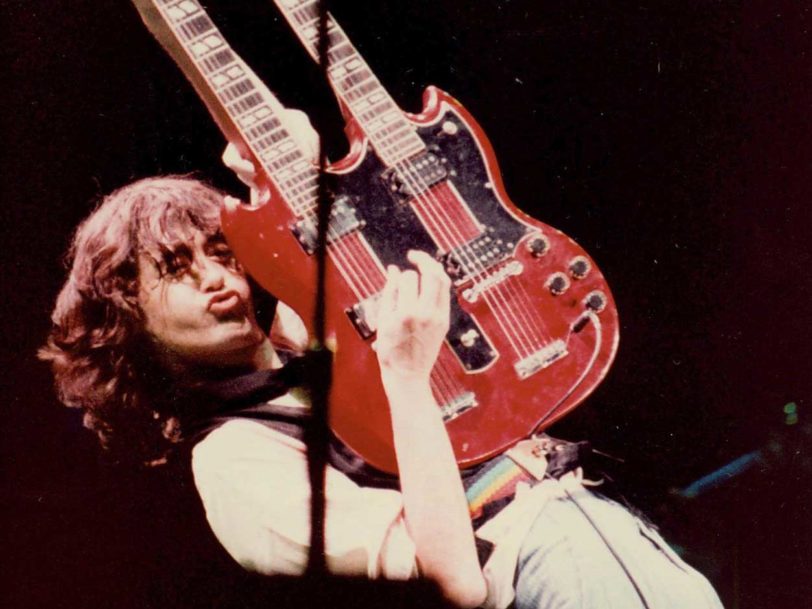Just like there are stories of blues hero Robert Johnson selling his soul to the Devil at the crossroads, so too are there suspicions that Led Zeppelin guitarist Jimmy Page and his near-supernatural abilities were the result of some Faustian pact. Page himself has enjoyed playing into this myth: it’s simply too hard to believe that a musician could be so talented that he created the magisterial guitar solo to Stairway To Heaven or the swirling splendour of Kashmir.
It’s also often recounted that Jimmy Page was a longtime admirer of philosopher-king Aleister Crowley, the amoral occultist who practiced “magick” and allegedly partook in satanic ceremonies. Page even took his idol-worship far enough in the early 70s to buy Crowley’s home, Boleskine House, a place where the controversial magician would purportedly practice black mass. The question of whether Led Zeppelin conjured similarly dark forces to bewitch us with their music still raises a few eyebrows.
https://open.spotify.com/playlist/37i9dQZF1DXc4xFsxShkAv
Tellingly, shortly before Jimmy Page founded Led Zeppelin, the guitarist visited a palm-reader who told him his life was about to change forever. As a keen believer in astrology, it seems Page had more than raw talent going for him – his success, if the story is true, was written in the stars. Or is the answer more complicated than that? Is it time we woke up and smelled the tea leaves? There is much more to Jimmy Page than mere hocus pocus…
In The Days Of My Youth: A Child Prodigy
Born in Heston on 9 January 1944, James Patrick Page had all the signs of becoming a musical prodigy from a very young age. After singing as a choirboy in St Barnabas Church, his true Damascene moment came when he heard guitarist Scotty Moore’s guitar work on Elvis Presley’s Baby, Let’s Play House. “His character guitar playing on those early Elvis Sun recordings, and later at RCA, was monumental,” Jimmy Page would later recall.
Page wouldn’t learn how to play guitar himself until his early teens, but once he did he mastered the instrument incredibly quickly. Forming his own band, The James Page Skiffle Group, at just 13 years old, a young Page appeared on a BBC TV show for children in 1957. Playing a Lead Belly cover, the teenage guitarist told host Huw Weldon he wanted to find a cure for cancer when he grew up.
Clearly not shy of ambition, Jimmy Page’s musical interests were – like most young boys of his generation – piqued by early rock’n’roll hits from Jerry Lee Lewis and Gene Vincent. The budding talent’s ability to play Chuck Berry guitar solos is what resulted in him being invited to join Red E Lewis And The Red Caps as their new guitarist – quite remarkable considering he was just 15 years old and still at school at the time.
Your Time Is Gonna Come: Early Years As A Guitarist
After telling his headteacher he now wanted to be pop star, Jimmy Page left school with four GCE O levels under a cloud of disappointment, but his prospects were far from gloomy. Going by the name Nelson Storm, his talent on guitar continued to evolve as Red E Lewis’ band rechristened themselves Neil Christian And The Crusaders.
At 18, however, Page quit the group to enrol at Sutton Art College. It was here he studied painting, but his love of music was kept aflame by delving deeply into the blues. He formed a close friendship with fellow-student and guitarist Jeff Beck, and together both boys bonded over their shared love of rock’n’roll. They remain close friends to this day.
Jimmy Page continued to play guitar in the early 60s at various late-night music venues in London. When producer Mike Leander saw him perform one evening, he offered Page a job as a session musician. “I was really surprised,” Page remembers. “Before this I thought session work was a closed shop.” This would prove to be the big break into the music industry the young Page was dreaming of.
It’s Time To Ramble On: Session Work
For the next several years, Jimmy Page would receive unparalleled experience as a young musician. Finding himself working in a busy recording studio, not only did he learn the ins and outs of music production, but he also adapted his guitar style to songs from a wide range of genres. From vocal jazz-oriented pop (Shirley Bassey’s James Bond theme song Goldfinger) to slow country ballads (Val Doonican’s Walk Tall), Jimmy Page mastered every single guitar style he could possibly learn.
Following a period of Beatlemania, when the British music scene was flowering like a springtime burst, Jimmy Page was as happy as a bee bringing pollen to the hive. He found himself lending his skills to those at the vanguard of the British Invasion, playing guitar with The Rolling Stones (Heart Of Stone), The Kinks (I’m A Lover, Not A Fighter), The Who (Bald Headed Woman) and even David Bowie’s early group The Manish Boys (I Pity The Fool).




